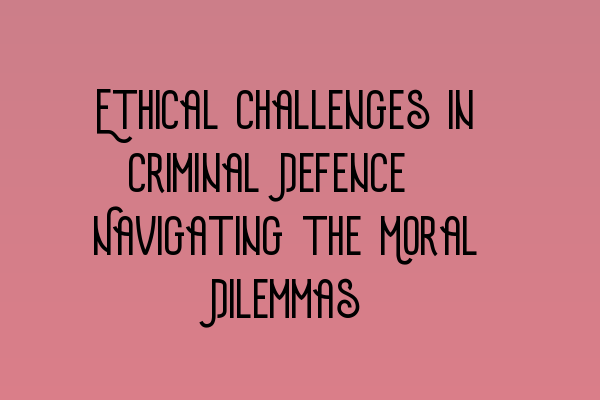Ethical Challenges in Criminal Defence: Navigating the Moral Dilemmas
As criminal defence solicitors, we are faced with numerous ethical challenges on a regular basis. Our profession requires us to balance the rights of our clients with our moral responsibilities to society. Navigating these moral dilemmas requires a deep understanding of the law, rigorous ethical standards, and a commitment to justice.
1. Confidentiality and Privilege
One of the fundamental pillars of our legal system is client confidentiality and legal privilege. It is our duty to maintain the privacy and trust of our clients. However, there may be situations where our ethical obligations clash with our duty to uphold the law. It is essential to carefully navigate these situations while always remaining within the boundaries of the law.
To learn more about the concept of confidentiality and legal privilege, you can check out our related article on SQE 1 Practice Exam Questions.
2. Zealous Representation
As criminal defence solicitors, we have a duty to provide zealous representation for our clients. This means vigorously advocating for their rights and interests, even in the face of overwhelming evidence. However, this can sometimes raise ethical concerns, especially when we have knowledge of our client’s guilt.
To prepare for the challenges of zealous representation, we recommend practicing with our SQE 1 Practice Mocks FLK1 FLK2 to enhance your skills.
3. Conflict of Interest
Another ethical challenge we often encounter is the potential for a conflict of interest. We must remain diligent in identifying and addressing any conflicts that may arise between our own interests, our firm’s interests, and the best interests of our clients. Failure to do so can compromise our duty to provide effective representation.
If you are interested in learning more about how to navigate conflicts of interest, consider enrolling in our comprehensive SQE 2 Preparation Courses.
4. Upholding the Rule of Law
As legal professionals, we play a pivotal role in upholding the rule of law. However, there may be instances where defending a client’s rights conflicts with our personal beliefs or societal norms. It is crucial to balance our ethical obligations with our duty to ensure a fair and just legal process.
5. Professional Boundaries
Maintaining professional boundaries is essential in ensuring ethical conduct. We must refrain from engaging in any behavior that compromises our integrity or undermines the justice system. Upholding professionalism is vital for building trust with our clients and maintaining the credibility of the legal profession.
For information about important dates related to the SRA SQE exams, you can refer to our article on SRA SQE Exam Dates.
Conclusion
As criminal defence solicitors, we face ethical challenges that require us to navigate intricate moral dilemmas. It is essential to understand the law, uphold confidentiality, provide zealous representation while managing conflicts of interest, and maintain professional boundaries. By carefully balancing these obligations, we can effectively advocate for justice and ensure the fair application of the law.
